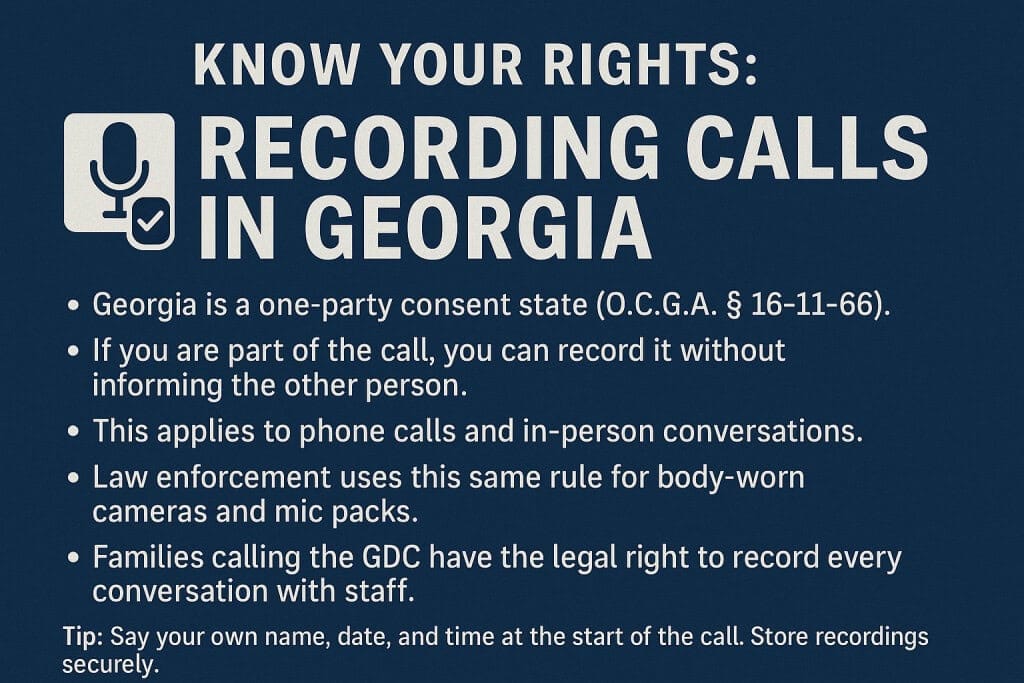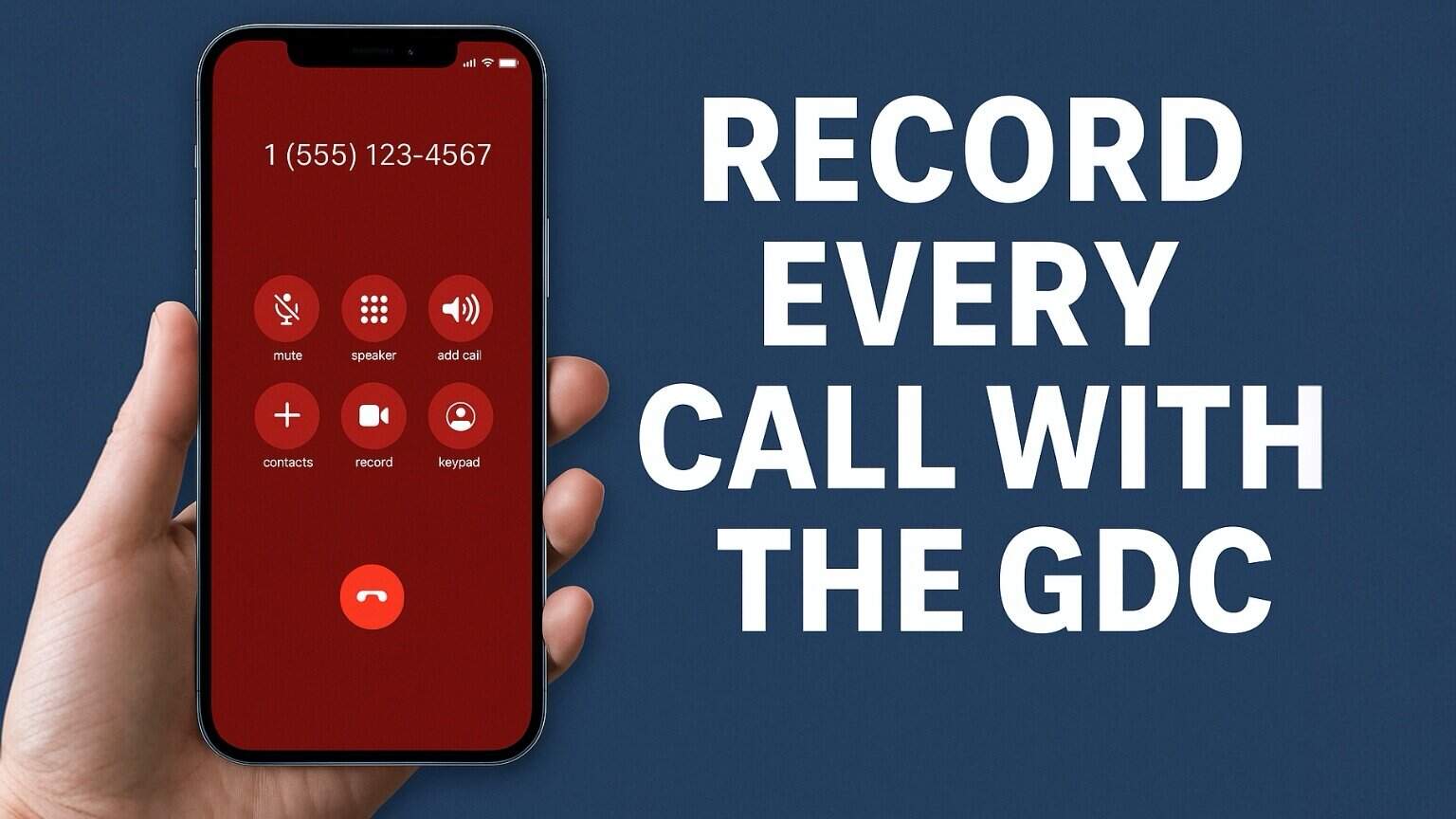When Georgia families call the Department of Corrections to ask about their loved ones, they often face a wall of silence. Parents and spouses are routinely ignored, belittled, or even cursed at for asking simple questions. Too often, they are met with stonewalling when the questions matter most: Was my loved one stabbed? Were they hospitalized for a medical emergency? Did they die?1
The Georgia Department of Corrections (GDC) almost never provides answers. Families are left to learn of deaths from other incarcerated people, through whispered phone calls or social media posts, while officials dodge questions and hide the truth. This is not just bad customer service — it is part of the culture of dehumanization and cover-up that the U.S. Department of Justice (DOJ) and the Atlanta Journal-Constitution (AJC) have already documented inside the prisons 2 3.
But Georgia families have a powerful tool they can use — one that GDC staff cannot erase: record every single call.
Why Families Should Record Every Call
Recording calls serves two purposes:
1. Evidence of mistreatment. Families regularly report being disrespected, yelled at, or mocked by GDC staff. A recording preserves those interactions and exposes the contempt staff show toward the public.
2. Accountability. The DOJ found that GDC misclassifies homicides and conceals violence.4 The way staff treat families is part of the same culture of denial. Every recording is proof the public can see, share, and demand accountability from.
GDC records every call that prisoners make. Families should use the same right to protect themselves and document the truth.
The Legal Right to Record
Georgia is a one-party consent state under O.C.G.A. § 16-11-66. That means if you are a party to the conversation, you can record it without informing the other person.
This is the same rule law enforcement relies on for body-worn cameras and microphone packs. Families are not breaking any law by recording their calls with GDC staff.

How Families Can Record Calls
You don’t need expensive equipment. Here are safe, practical ways:
- Smartphone apps:
- Android: “ACR Call Recorder,” “Cube ACR”
- iPhone: “TapeACall,” “Rev Call Recorder”
- Old-school method: Put the call on speakerphone and use a second device (another phone, a digital recorder, or even a laptop) to capture the audio.
- Best practice: At the start of the call, say your own name, the date, and the time. This anchors the recording in context.
If you decide to share recordings publicly:
- Remove or bleep out personal details like phone numbers or sensitive health information.
- Post clips on Facebook, TikTok, or Instagram to show the public exactly how the GDC treats families.
- Or simply preserve the recordings as evidence to provide to journalists, advocates, or attorneys later.
Safety and Best Practices
- Don’t bait staff. Ask legitimate questions about your loved one’s safety and medical condition. Let the recording capture the natural interaction.
- Don’t announce you’re recording. You are not required to under Georgia law, and announcing may change staff behavior.
- Store recordings securely. Keep backups on your phone, computer, or cloud storage so they can’t be lost.
Connecting to a Larger Pattern
This isn’t about rude phone manners. It’s about a pattern of systemic abuse and secrecy.
- The DOJ has already confirmed that serious incidents of violence are “exponentially more frequent” than GDC reports.
- The AJC has documented how GDC withholds cause-of-death information, misclassifies murders, and refuses transparency.
- The way staff treat families is another side of the same culture: deny, conceal, and dehumanize.
By recording their calls, families can push back against this culture and create their own archive of truth — evidence the GDC cannot hide.
Call to Action
Georgia’s prisons will not change themselves. Officials have shown that they will not be transparent unless they are forced to. That is why families and advocates must use every tool available to expose the truth.
👉 Record every call.
👉 Share recordings with advocates, journalists, or post them online.
👉 Use ImpactJustice.AI to send your evidence and demands directly to legislators and decision-makers.
Every recording builds a record of abuse. Every voice raised in protest adds to the pressure. Together, we can show the world how Georgia’s prison system treats families — and demand the change our loved ones deserve.


- GPS article:Buried Truth: The Story of Roy Mason Morris: https://gps.press/buried-truth-the-story-of-roy-mason-morris/[↩]
- DOJ Findings Report on Georgia Prisons (PDF): https://www.justice.gov/usao-ndga/media/1371541/dl?inline=[↩]
- AJC – Georgia prison system engages in deception as crisis builds: https://www.ajc.com/news/investigations/georgia-prison-system-engages-in-deception-as-crisis-builds/[↩]
- GPS:The Hidden Violence in Georgia’s Prisons: Beyond the Death Toll: https://gps.press/the-hidden-violence-in-georgias-prisons-beyond-the-death-toll/[↩]
- Georgia Recording Law – Reporters Committee: https://www.rcfp.org/reporters-recording-guide/georgia/[↩]

3 thoughts on “Record Every Call: How to Expose Contempt and Abuse”